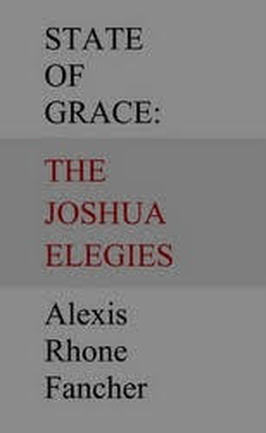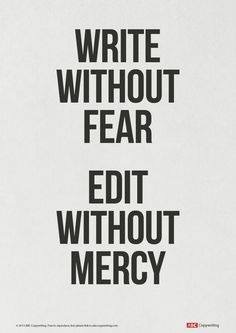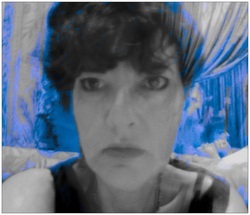Carpe Noctem Chapbook Interview With Alexis Rhone Fancher

THINGS WE’D LOVE TO KNOW…
Let’s start with the chapbook’s title, State of Grace: The Joshua Elegies, and your cover image (and also the haunting images inside). How did you choose each? And, if I asked you to describe or sum up your chapbook, what three words immediately come to mind?
I wanted the cover of the chapbook to have a certain gravitas. My publisher at KYSO Flash Press, Clare MacQueen, and I agreed that there would be no photos on the front cover. Just words, plain, and sobering. The images inside of the chapbook were arrived at over several weeks, after we had ordered the poems. Again, it was a collaboration. I provided Clare with about a dozen of my photos I thought might be right, and we whittled them down to eight. The photo of my son at the end of the book has always been a favorite. He looks so happy. As for the self-portrait on the back cover, I shot that shortly before Josh died. Every time I see it, I remember exactly how I felt. Like a train wreck.
Three words to describe the chapbook: Tragedy. Transcendence. Grace.
This collection is a series of elegiac poems for your son Joshua, who passed away from cancer at age 26. In the poems you fill the gap your son left with such clear bits (a text, a voicemail, his room intact, a photo of his beautiful girlfriend) and memories of him (on the court playing basketball, after his arm amputation). For example, in “Snow Globe,” the narrator wears worrying finger marks on the outside of the velvet bag that contains her son’s ashes—she contemplates smearing ash on her forehead because, “Unless I look in the mirror/ I can’t see him.” In “My Dead Boy’s Right Arm,” the narrator just wants her son to come back and say, “Mama, really, it’s not so bad/ being dead at 26.” As a mother who writes, do you feel that this collection has helped memorialize your son/kept part of him alive in these poems? How have these poems helped people who knew him—and grieve for him?
I don’t know if it is possible for me to write anything good enough to memorialize my son properly. He was a fine human being. Compassionate, with heroic courage. Friends and family have read several of these poems as they were published in journals and lit mags. I hope they brought some comfort. I don’t know. When the chapbook comes out, I’ll see how it lands.
In several of the poems (for example, “Death Warrant” and “The Competition”), you confront hurtful things people have said to you in the wake of your son’s passing. In “Over It,” a friend asks the narrator two weeks after her son’s death if she’s over it, and the narrator’s scathing response in the poem is: “I want to ask her how her only daughter/ is doing. And for one moment I want her to tell me she’s/dead so I can ask my friend if she’s over it yet./ I really want to know.” Have you written this collection both as a way to communicate with people who are grieving and to people who need to know how to talk with those in mourning?
“Over It” was written as a reaction to a friend’s astonishing insensitivity, two weeks after my son died. I remember asking her, “If your daughter had died two weeks ago, would you be over it yet?” She had no answer. “Over It” was published in Rattle in 2013. I continue to receive emails and letters regarding it, especially from the newly-bereaved. The judge in “Death Warrant” had no soul, a product of a numbing judicial system and her own heartlessness. I walked out of that courtroom, reeling. These are incidents that devastated me as a mother, but empowered me as a poet.
I wrote State of Grace: The Joshua Elegies as a road map through my sorrow. How do you help a grieving mother? What do you say? The people who start with “I know how you feel” are the worst. Unless you have lost a child, you cannot know. It is almost an insult, save that I know they are trying to express their concern and have no words. The friends who simply showed up were the ones that made a difference. As for the ones who disappeared once they heard my son’s prognosis? What can I say? Here’s what I learned: It isn’t about you, or your dying child. It is about how each of us deals with death. Cultural. Personal. During Joshua’s illness, many close family members and friends disappeared. Strangers and casual acquaintances showed up in extraordinary ways; their generosity and kindness of heart still astonishes and sustains me.
In your introductory author’s note, you write, “But I would give anything to know that he’s okay. That he is whole and safe. That he is aware of my great love for him and my devastation at not being able to save him. I should have saved him. That’s what mothers do.” These are poems that lay a mother’s grief bare—in plain sight. There’s no sugar-coating here. There is a progression through the stages of grief in these poems, and even a look at grief seven years out: “a woman is taking her dead boy’s eyes/ to the moon/she wants to show him the whole earth/before he finally gets some sleep” (“when her son is dead seven years). Many say that writing through grief aids in the healing process—what has writing these poems done for you as you work through the loss of your son?
Regarding writing through grief. The poems in this chapbook came so slowly. In the time it took me to write these few poems about my son, I wrote and had published over 100 poems that were not about Joshua. The grief poems were hard to write. Putting myself into that headspace, tapping into that endless sorrow, is exhausting, devastating. And it doesn’t get easier with time. There are no “steps” to grieving and then it is done. It isn’t. And especially for me, as an artist—not if I want to write about it authentically. Each time I write a poem about my son I feel the same devastation that I felt the day he died. And as a poet, I have to trot that devastation out and dive into it. That’s what we poets do.
Can you describe your writing practice or process for this collection?
This collection was written over almost eight years. The poems were written as a response to Josh’s death and as a response to the actions of the people around me during his illness and afterward. I didn’t start out to write a chapbook. I simply wanted a way to express my grief.
As for my writing practice, I write daily, a minimum of four hours a day. Every day. Usually more. I am a strong believer in editing. Editing. Editing. I have a peer editor who sees all my poems before anyone else does. I also have a paid editor, whom I have worked with for the past three years. As I wrote in the Acknowledgments, she holds my feet to the fire.
How did you order the poems in the collection? In general, do you have a specific method for arranging your poems or is it sort of haphazard, like you lay the pages out on the floor and see what order you pick them back up in?
I ordered the poems originally. Then I gave them to my publisher, and she rearranged them. That there are only 14 poems made it fairly easy to come to an agreement. For my full-length collection, How I Lost My Virginity To Michael Cohen…, I worked on the order of the poems with that publisher, as well. Never a haphazard process for me. Very deliberate. There needs to be a flow, and a destination. Recently, for a chapbook I’m working on, I put the name of each poem on a post it note and stuck them all on the wall. Highly recommended.
What do you love to find in a poem you read, or love to craft into a poem you’re writing?
I’m a huge fan of “story” and of the “aha moment,” or “zinger” at the end of a poem. My friend, the great Los Angeles poet, Laurel Ann Bogen, once told me that when she gets to the end of a poem (both as a reader and as a writer) she asks herself one question: “So what?” That kind of sums it up for me, as well.
Can you share an excerpt from your book? And tell us why you chose this poem for us to read--did it galvanize the writing of the rest of the collection? Is it your chapbook’s heart? Is it the first or last poem you wrote for the book?
I chose to share “The Competition” because it sums up where I am in the “grief process.” It was first published in KYSO Flash and nominated this year for a Best of The Net award. People tell me it speaks to them. The man who approached me after the reading has become a good friend.
THE COMPETITION
Thank you for coming.
After I put my despair on display,
and read those poems about
my dead son, I’m cornered by a stranger
who tells me he was orphaned
at sixteen. His mom was driving. He
walked away from the crash.
He tells me there’s a name for what
we survivors bear. Traumatic Grief.
A recognized condition. PTSD for the bereaved.
I could one-up him; my mom’s
early death, or the asleep at the wheel
trucker who killed my boyfriend and our
baby when I was nineteen,
make it a competition
I know I’d win.
Instead, I default, tell him I’m so sorry.
When he hugs me I’m swallowed
by the weight of our common loss. I want
him to take it all away.
Instead, when I go home, I carry twice what
I had before. PTSD. Survivor’s Guilt.
Our despair, and its proper name.
For you, what is it to be a poet? What scares you most about being a writer? Gives you the most pleasure?
What scares me most as a writer is the blank page. I don’t get writer’s block. But sometimes, the wide-openness of blank, white paper can be overwhelming. Too many choices. Too many stories to tell.
What gives me the most pleasure as a poet is editing my work, crafting the poem into precisely what I want to say in as few words as possible. I want my poems to shine like diamonds. That is what I work toward.
Are there other types of writing (dictionaries, romance novels, comics, science textbooks, etc.) that help you to write poetry?
I use an online thesaurus all the time. Also, I am a huge fan of researching a poem and often have ten pages or more of notes, quotes, odd facts, and anything else that helps me get inside.
What are you working on now?
My second, full-length collection of poems, working title: Enter Here, will be completed by the end of 2015. Additionally, I have two chapbooks I’m editing for publication; Gidget Goes To The Ghetto, about my courtship and marriage to my second ex-husband, Joshua’s father, Eric; and 27 Swan Songs, a collection of sonnets, written for my son shortly after he died.
What book are you reading that we should also be reading?
I’m re-reading Natalie Diaz’s great book of poems, When My Brother Was An Aztec; and Richard Jones’ The Blessing, and Ellen Bass’ The Human Line. These fine collections I read again and again. I just purchased Lucia Berlin’s collection of short stories, A Manual For Cleaning Women, and am looking forward to diving in. The foreword is by Lydia Davis, one of my favorite writers.
Without stopping to think, write a list of five poets whose work you would tattoo on your body, or at least write in permanent marker on your clothing, to take with you at all time.
The five poets whose work I would tattoo on my body without stopping to think (great question, btw) are: Dorianne Laux, Ellen Bass, Dylan Thomas, Carolyn Forche, and Steve Kowit. But that’s today. Ask me again tomorrow.
What’s a question you wish I asked? (And how would you answer it?)
What is my advice for beginning poets?

State of Grace: The Joshua Elegies was published by KYSO Flash Press in October 2015, and can be purchased here.
 Alexis Rhone Fancher is the author of How I Lost My Virginity To Michael Cohen and Other Heart Stab Poems, (Sybaritic Press, 2014). She’s published in Menacing Hedge, Ragazine, Slipstream, Fjords, H_NGM_N, great weather for media, Chiron Review, and elsewhere. Her poems are published in more than 30 American and international anthologies. Her photos are published worldwide. Since 2013 she has been nominated for four Pushcart Prizes and four Best of The Net awards. She’s photography editor of Fine Linen, and poetry editor of Cultural Weekly, where she publishes The Poet’s Eye, a monthly photo essay about her ongoing love affair with Los Angeles.
Alexis Rhone Fancher is the author of How I Lost My Virginity To Michael Cohen and Other Heart Stab Poems, (Sybaritic Press, 2014). She’s published in Menacing Hedge, Ragazine, Slipstream, Fjords, H_NGM_N, great weather for media, Chiron Review, and elsewhere. Her poems are published in more than 30 American and international anthologies. Her photos are published worldwide. Since 2013 she has been nominated for four Pushcart Prizes and four Best of The Net awards. She’s photography editor of Fine Linen, and poetry editor of Cultural Weekly, where she publishes The Poet’s Eye, a monthly photo essay about her ongoing love affair with Los Angeles.Visit her website at www.alexisrhonefancher.com.
Published on December 21, 2015 04:38
No comments have been added yet.



